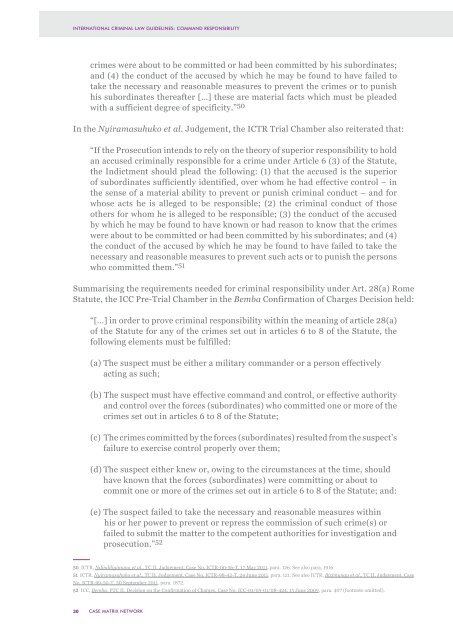Command Responsibility
CMN_ICL_Guidelines_Command_Responsibility_En
CMN_ICL_Guidelines_Command_Responsibility_En
You also want an ePaper? Increase the reach of your titles
YUMPU automatically turns print PDFs into web optimized ePapers that Google loves.
INTERNATIONAL CRIMINAL LAW GUIDELINES: COMMAND RESPONSIBILITY<br />
crimes were about to be committed or had been committed by his subordinates;<br />
and (4) the conduct of the accused by which he may be found to have failed to<br />
take the necessary and reasonable measures to prevent the crimes or to punish<br />
his subordinates thereafter […] these are material facts which must be pleaded<br />
with a sufficient degree of specificity.” 50<br />
In the Nyiramasuhuko et al. Judgement, the ICTR Trial Chamber also reiterated that:<br />
“If the Prosecution intends to rely on the theory of superior responsibility to hold<br />
an accused criminally responsible for a crime under Article 6 (3) of the Statute,<br />
the Indictment should plead the following: (1) that the accused is the superior<br />
of subordinates sufficiently identified, over whom he had effective control – in<br />
the sense of a material ability to prevent or punish criminal conduct – and for<br />
whose acts he is alleged to be responsible; (2) the criminal conduct of those<br />
others for whom he is alleged to be responsible; (3) the conduct of the accused<br />
by which he may be found to have known or had reason to know that the crimes<br />
were about to be committed or had been committed by his subordinates; and (4)<br />
the conduct of the accused by which he may be found to have failed to take the<br />
necessary and reasonable measures to prevent such acts or to punish the persons<br />
who committed them.” 51<br />
Summarising the requirements needed for criminal responsibility under Art. 28(a) Rome<br />
Statute, the ICC Pre-Trial Chamber in the Bemba Confirmation of Charges Decision held:<br />
“[…] in order to prove criminal responsibility within the meaning of article 28(a)<br />
of the Statute for any of the crimes set out in articles 6 to 8 of the Statute, the<br />
following elements must be fulfilled:<br />
(a) The suspect must be either a military commander or a person effectively<br />
acting as such;<br />
(b) The suspect must have effective command and control, or effective authority<br />
and control over the forces (subordinates) who committed one or more of the<br />
crimes set out in articles 6 to 8 of the Statute;<br />
(c) The crimes committed by the forces (subordinates) resulted from the suspect’s<br />
failure to exercise control properly over them;<br />
(d) The suspect either knew or, owing to the circumstances at the time, should<br />
have known that the forces (subordinates) were committing or about to<br />
commit one or more of the crimes set out in article 6 to 8 of the Statute; and:<br />
(e) The suspect failed to take the necessary and reasonable measures within<br />
his or her power to prevent or repress the commission of such crime(s) or<br />
failed to submit the matter to the competent authorities for investigation and<br />
prosecution.” 52<br />
50 ICTR, Ndindiliyimana et al., TC II, Judgement, Case No. ICTR-00-56-T, 17 May 2011, para. 126. See also para. 1916.<br />
51 ICTR, Nyiramasuhuko et al., TC II, Judgement, Case No. ICTR-98-42-T, 24 June 2011, para. 121. See also ICTR, Bizimungu et al., TC II, Judgement, Case<br />
No. ICTR-99-50-T, 30 September 2011, para. 1872.<br />
52 ICC, Bemba, PTC II, Decision on the Confirmation of Charges, Case No. ICC-01/05-01/08-424, 15 June 2009, para. 407 (footnote omitted).<br />
30<br />
CASE MATRIX NETWORK


